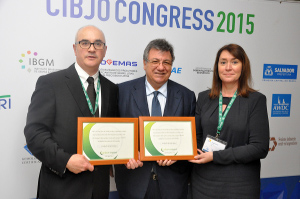A special session focusing on issues related to Corporate Social Responsibility, which was held during the afternoon of the first day of the 2015 CIBJO Congress in Brazil, focused on issues related to CSR compliance and carbon neutrality in the jewellery industry.
Professor Donald Feaver, of the Branded Trust foundation, which is developing an online CSR compliance system for the jewellery and gemstone industry together with CIBJO, spoke about the new agenda in Corporate Social Responsibility (CSR) that is emerging.
He said that the jewellery industry has traditionally focused on supply chain issues. But, he added that there is a change taking place, with a connection between the “soft side,” which is sustainability, with the “hard side” which is finance. “Sustainability is moving into the CFO’s office, not the CSR office. CSR is turning from a cost into an investment with return expected,” he explained.
Talking of future trends to help CSR create return on investment, he said that programmes are coming that can capture and measure sustainability, and that there are improvement-driven computer techniques as opposed to performance auditing.
In addition, Dr. Feaver added, there is green energy optimisation linking carbon reduction to carbon trading, and automated social reporting and stock exchange disclosure reporting.
He said that CIBJO has recognised new trends and introduced a jewellery course for professionals with insights into the new CSR agenda. This gives new information, not the old, already-known information, as well as a practical approach for firms to apply it with online lessons and tests.
Meanwhile, Jonathan Kendall, President of CIBJO’s Marketing and Education Commission, spoke of the issue of how environmentally aware the jewellery sector is becoming. CIBJO provides direction with policies and sets an example for the industry.
“It is clear that our industry is going to be challenged over next 10 years and more on this issue. CIBJO can claim to be a carbon neutral organisation. We have led from the front and set an example. We are beginning to move forward,” he stated.
He said that, in the diamond pipeline, significant steps have been taken by companies such as Rio Tinto, Alrosa, De Beers, and Petra Diamonds in reducing emissions. The big retailers are also active, such as Signet, Walmart, Chow Tai Fook, Tiffany & Co and Gucci.
Kendall said that the issue is being driven by consumers, especially those under 35, and women, as they want to trust a brand or business. Most consumers are concerned about the environmental impact and sustainability and want to see a positive approach to those topics.
CIBJO started a jewellery industry carbon measurement initiative, which aims to set an industry standard, last year in Moscow ,with several early adopters, he said, adding that it is hoped to launch climate leadership awards.
This congress is the first-ever significant industry event to be carbon neutral, and it follows CIBJO having achieved carbon neutrality both in 2013 and 2014. Present in Salvador, and explaining the process to the session was Moya McKeown, an environmental consultant with Carbon Expert, which had assisted CIBJO in the process.
Fairtrade activist Greg Valerio pointed out that most of the jewellery industry is comprised of smaller firms not corporates, so they do not have the resources to implement CSR. “However, CIBJO has come far in the last two to three years. There is something significant happening here,” he stated.
Also addressing the session was Hanifa Mezoui, a senior advisor at the United Nations, who complemented the jewellery industry on its efforts to incorporate responsible social and environmental policies into its operation.
Photo Caption: CIBJO President Gaetano Cavalieri (center), holding the certificates presented by Carbon, attesting to the organisation’s achiving carbon neutrality in 2013 and 2014. He is flanked by Jonathan Kendall, President of CIBJO’s Marketing and Education Commission, and Moya McKeown, an environmental consultant with Carbon Expert.

